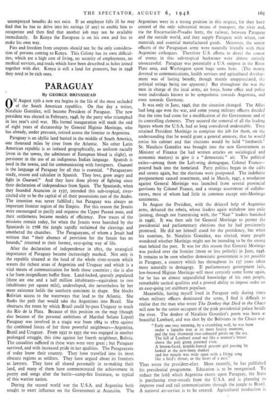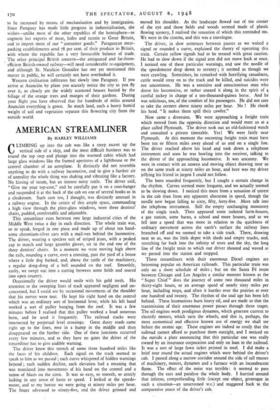PARAGUAY
By GEORGE BRINSMEAD
ON August 15th a new era begins in the life of the most secluded of the South American republics. On that day a writer, Natalicio Gonzalez, will become President of Paraguay. The new president was elected in February, 1948, by the party who triumphed
in last year's civil war. His formal inauguration will mark the end of eight years of dictatorship by General Higinio Morinigo, who has already, under pressure, retired across the frontier to Argentina.
Paraguay is an idyllic land buried in the middle of South America, one thousand miles by river from the Atlantic. No other Latin American republic is so isolated geographically, so uniform racially (even in the towns, the admixture of European blood is slight), so persistent in the use of an indigenous Indian language. Spanish is used in the towns, and for communicating with foreigners. Guarani is the language of Paraguay for all that is essential. "Paraguayans study, reason and calculate in Spanish. They love, grow angry and fight in Guarani." And they have done plenty of fighting since their declaration of independence from Spain. The Spaniards, when they founded Asuncion in 1537, intended this sub-tropical, river- circled city to be the capital of all their possessions east of the Andes. The intention was never fulfilled ; but Paraguay was always an important frontier region of the Empire. For this reason the Jesuits were encouraged to pacify and organise the Upper Parana zone, and their settlements became models of efficiency. Few traces of the missions remain today, for when the Jesuits were banished by the Spaniards in 1768 the jungle rapidly reclaimed the clearings and smothered the churches. The Paraguayans, of whom a Jesuit had written that " their absence of provision for the future has no bounds," returned to their former, easy-going way of life.
After the declaration of independence in 1811, the strategical importance of Paraguay became increasingly marked. Not only is the republic situated at the head of the whole river-system which waters the richest areas of Argentina and Uruguay and which is a vital means of communication for both those countries ; she is also a far from insignificant buffer State. Land-locked, sparsely populated (there are one and a half million inhabitants—equivalent to two inhabitants per square mile), undeveloped, she nevertheless by her mere existence holds the southern continent in shape. She blocks Bolivian access to the waterways that lead to the Atlantic. She flanks the path that would take the Argentines into Brazil. She obstructs the route by which Brazil could by-pass Uruguay to reach the Rio de la Plata. Because of this position on the map (though also because of the personal ambitions of Marshal Solano Lopez) Paraguay was involved in a tragic war from 1864 to 1870 against the combined forces of her three powerful neighbours—Argentina, Brazil and Uruguay. From 1932 to 1935 she was engaged in another prolonged struggle, this time against her fourth neighbour, Bolivia. The casualties suffered in these wars were very great ; but Paraguay survived, and with increased pride in her qualities. The Paraguayans of today know their country. They have travelled into its most obscure regions as soldiers. They have argued about its frontiers as lawyers. They have all shared personally in re-making their land, and many of them have commemorated the achievement in poetry and songs after the battle—camp-fire literature, so typical of this warrior nation.
During the second world war the U.S.A. and Argentina both sought to exert influence on the Government at Asuncion. The Argentines were in a 'strong position in this respect, for they have control of the only substantial means of transport, the river and, via the Encarnacion-Posadas ferry, the railway, between Paraguay and the outside world, and they supply Paraguay with wheat, raw materials and essential manufactured goods. Moreover, the senior officers of the Paraguayan army were naturally friendly with their Argentine colleagues. Therefore U.S. efforts to direct the course of events in this sub-tropical backwater were almost entirely unsuccessful. Paraguay was potentially a U.S. outpost in the River Plate area, and Washington spent huge sums here. (The money devoted to communications, health services and agricultural develop- ment was of lasting benefit, though mainly unappreciated, the political strings being too apparent.) But throughout the war the men in charge of the local army, air force, home office and police were individuals known to be sympathetic towards Argentina, and even towards Germany.
It was only in June, 1946, that the situation changed. The Allies had long ago won the war, and some young military officers decided that the time had come for a modification of the Government and of its controlling elements. They secured the removal of all the leading figures whom the U.S.A. had so long considered undesirable. They retained President Morinigo to complete the job for them, on the understanding that he would grant a general amnesty, that he would revise his cabinet and that elections would be held " forthwith." Sr. Natalicio Gonzalez was brought into the new Government as Minister of Finance (he had written articles on sociological and economic matters) to give it a " democratic " air. The political exiles—among them the Left-wing demagogue, Colonel Franco— poured back into the homeland. Party politics began in the cafés and streets again, but the elections were postponed. The indefinite postponement caused resentment, and in March, 1947, a revolution against General Morinigo was launched from several provincial garrisons by Colonel Franco, and a strange assortment of collabo- rators, most of whom had little in common except anti-Morinigo sentiments.
In August the President, with the delayed help of Argentine arms, defeated the rebels, whose leaders again withdrew into exile (joining, though not fraternising with, the " Nazi " leaders banished in 1946). It was then safe for General Morinigo to permit the presidential and parliamentary elections that he had persistently promised. He did not himself stand for the presidency, but when his nominee, Sr. Natalicio Gonzalez, was elected, many people wondered whether Morinigo might not be intending to be the strong man behind the poet. It was for this reason that General Morinigo was pushed over the frontier (more or less politely) in June, 1948. It remains to be seen whether democratic government is yet possible in Paraguay, a country which has throughout its 137 years taken more naturally to demagogy. If parliamentary government fails, low-browed Higinio Morinigo will most certainly come borne again, for he has an almost unparalleled knowledge of his own people, remarkable tactical qualities and a proved ability to impose order on an easy-going yet stubborn populace.
Meanwhile, having myself lived in Paraguay only during times when military officers dominated the scene, I find it difficult to realise that the man who wrote The Donkey that Died in the Chaco will now be the senior occupant of the pink presidential palace beside the river. The donkey of Natalicio Gonzalez's poem was born at beautiful Lambare, and was shot by the Bolivians in the Chaco war.
" Early one rosy morning, by a crumbling wall, he was born under a lapacho tree at its most festive moment, and the tree showered rose-coloured petals on the ass. The hill of Lambare stood out like a woman's breast above the pale green paternal river.
A brown-faced, nimble-footed peasant girl passing by looked at the new-born donkey and her mouth was wide open with a lilting song like a bird's throat, or the heart of a nest."
Thus wrote the president-elect. More recently, he has published his presidential programme. Education is to be reorganised. To reduce the hold which Argentina exerts upon Paraguay, the State is purchasing river-vessels from the U.S.A. and is planning to improve road and rail communications through the jungle to Brazil. A national air-service is to be created. Agricultural production 13
to be increased by means of mechanisation and by immigration. Since Paraguay has made little progress in industrialisation, she wishes—unlike most of the other republics of the hemisphere—to augment her exports of meat, hides and tannin to Great Britain, and to import more of our " consumer goods." Paraguayan meat- packing establishments send 78 per cent. of their produce to Britain, with whom the republic has a very favourable balance of trade. The other principal British concern—the antiquated and far-from- efficient British-owned railway—will need considerable re-equipment, and although Sr. Natalicio Gonzalez has not yet mentioned this matter in public, he will certainly not have overlooked it.
Western civilisation infiltrates but slowly into Paraguay. If you arrive at Asuncion by plane you scarcely notice the city as you fly over it, so closely are the widely scattered houses buried by the foliage of the orange trees and mangos of their gardens. During your flight you have observed that for hundreds of miles around Asuncion everything is green. So much land, such a heavy humid weight of soil and vegetation separate this flowering city from the outside world.



































 Previous page
Previous page